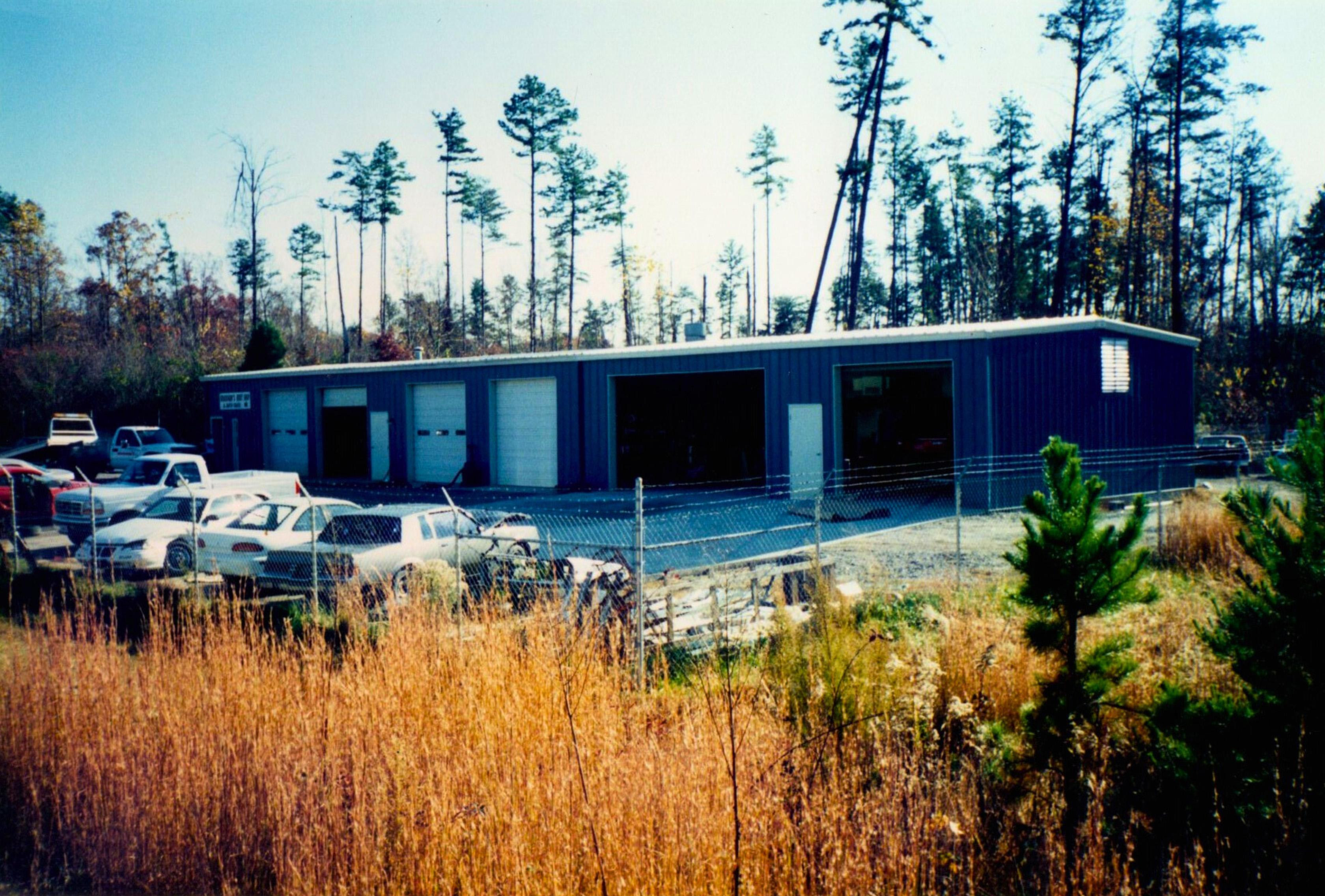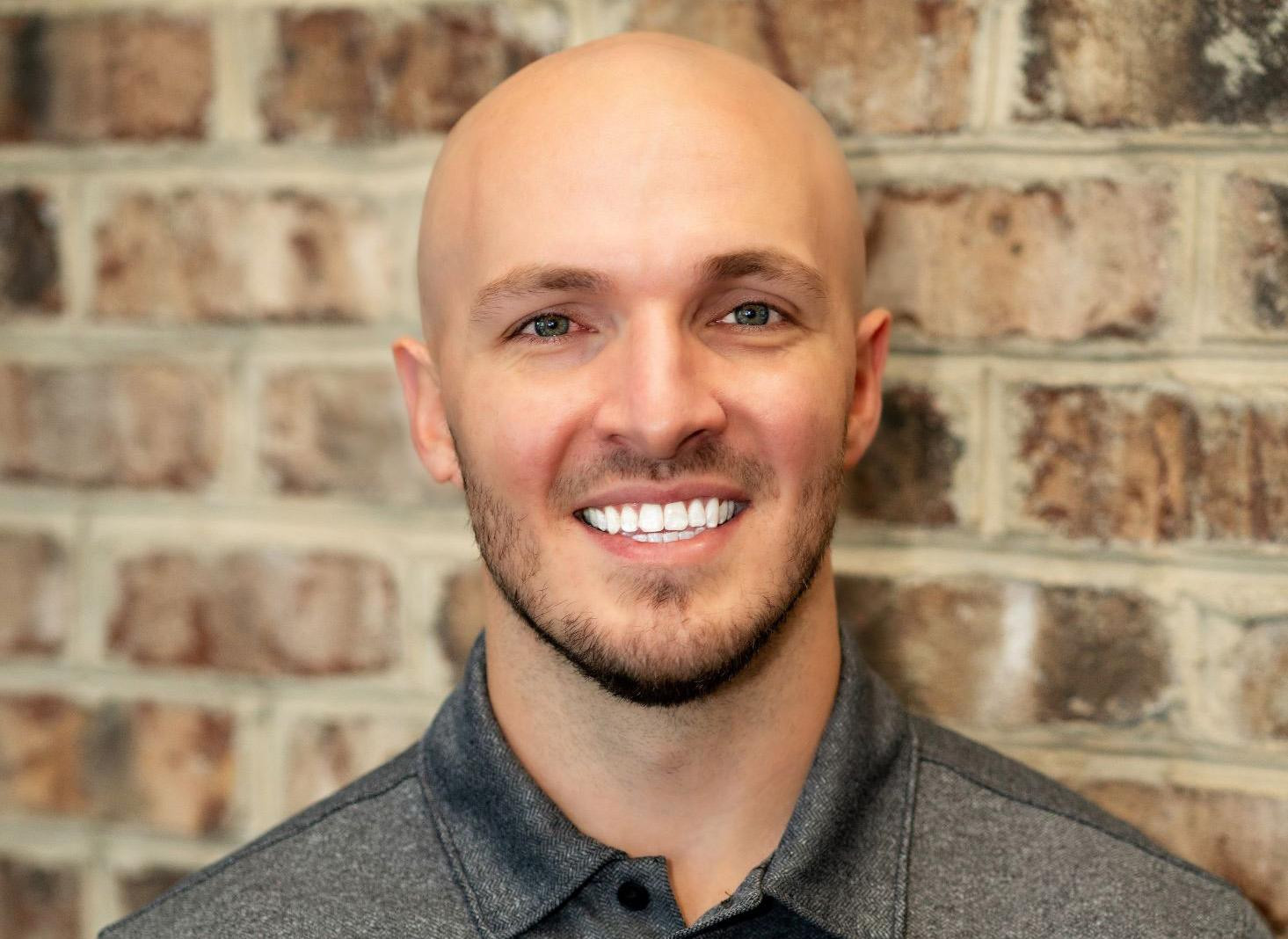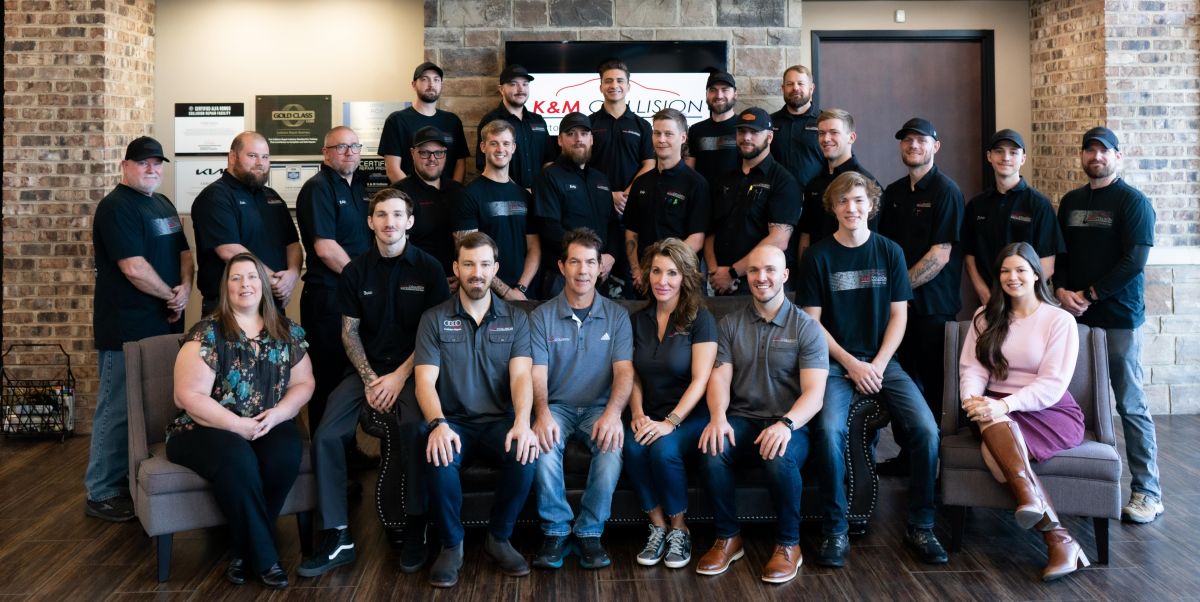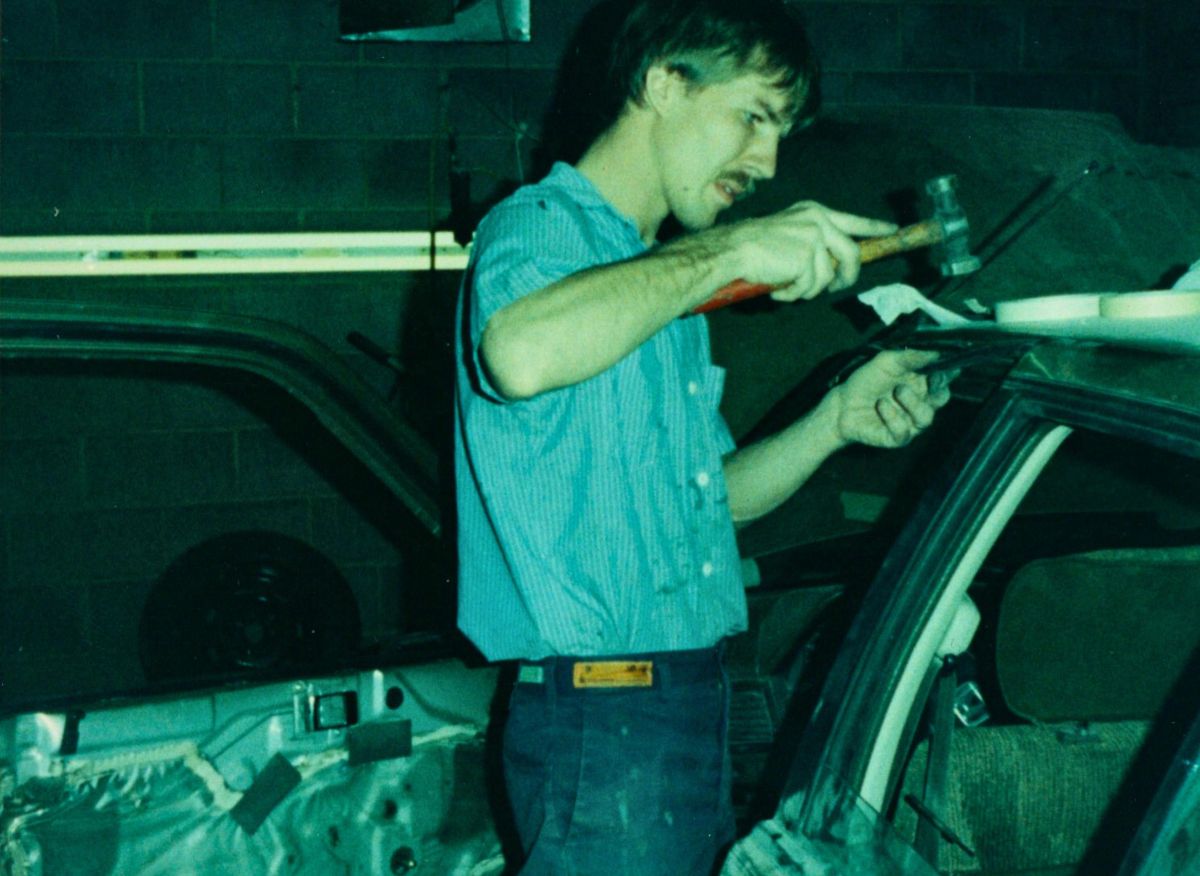Kevin and Meredith Bradshaw were K & M Collision. Kevin started the business at 20 years old and bootstrapped it with one employee and his wife by his side as the couple raised five children. Now, four of their boys work in the business in some capacity, and the couple has taken a step back into retirement. It’s their sons’ turn to service the luxury owner clientele that seeks out K & M above other shops in the region.
Passing the family business down through generations is the dream many small business owners entertain when they get things off the ground, but it’s one that’s becoming more unusual.
“I think a lot of parents are not encouraging their kids to be in this business,” said Josh Kent, executive director of the Carolinas Collision Association. “We’ve been in such a buying market for the past few years. I see a lot of guys just throwing the towel in and selling their shops.”
The question, though, is why is the legacy auto body shop dwindling?
The COVID Factor
The frequency of situations where children buy shops outright from parents or pay a percentage to founding family members and take over after functioning as managers in training is decreasing, explained Kent. Today, it’s more common, he asserted, for chain organizations to buy privately owned shops.
“We saw a mad rush of vehicles after COVID -- like shops had been busier than they've ever been in their history,” he said. “Because shops were so busy -- and I mean it was just chaos -- I think they (chains) felt like it was a great opportunity to get in there.”
On the flipside of that equation are shop owners’ shortcomings.
It’s a trend he saw intensify after the pandemic. The rush that ensued after businesses began opening back up contributed to a lot of shop sales.
 An earlier footprint of K & M Collision in Hickory, NC. Photo contributed by K & M Collision.
An earlier footprint of K & M Collision in Hickory, NC. Photo contributed by K & M Collision.
“A lot of people were not prepared for COVID,” Kent said. “A lot of shops had been running their businesses like they've been running them for the past 20 years, and so, when COVID hit and shut down everything, a lot of people went broke and didn't have the funds.”
An ongoing lack of education across the board and a shortage of employees has continued to contribute, he contended. And structure can be an issue -- businesses often don’t have the setup to bring in new people or to administer proper training.
“A lot of shops have the old school mentality, and that old school mentality is ‘Stick a broom in their hand and see if they stick,’” he said. "I've talked to several shops who start off some of these new employees as a detailer, and I understand keeping them there for a very short time because most people don't want to be a detailer. They find that they're getting stuck in a position that they feel may go nowhere. They're going to leave.”
‘He Had This Vision’
Mindset shifts in an industry that’s experienced massive change since K & M opened more than three decades ago seem almost mandatory. Kevin Bradshaw touched off a spark in 1991 that he painstakingly puffed into a fire he could hand over to his sons. But it wasn’t until that second generation joined the business that things truly blazed.
Kyle Bradshaw is currently the company’s director of fixed operations, and he also serves as president of the CCA. His brother, Michael, got involved in the family business right out of high school nearly two decades ago. Michael brought to the endeavor an analytical nature and a love of reading.
 Kyle Bradshaw, director of fixed operations at K & M Collision.
Kyle Bradshaw, director of fixed operations at K & M Collision.
“He just did a lot of reading through trade publications … (He) had heard about the certification route and decided to talk my dad into investing some money into some equipment. I think my brother was 18 at the time and actually approached our local Volkswagen dealer to ask them if they would sponsor us for the Volkswagen certification program,” Kyle recalled. “That's really when our business took off. He had this vision to kind of grow it.”
The Legacy Shop in Practice
Today, the business serves luxury and higher-end clientele, and despite its comparatively out-of-the-way location in Hickory, NC, an hour north of Charlotte, the decision to go niche has gone a long way. Covering a whittled-down market allows the shop to reach significantly beyond its physical location, serving customers within a four- to five-hour radius. Pick-up and delivery, Kyle said, play in significantly. The business has about 130 vehicles on site at a given time and processes around 100 of them each month.
Kyle, 32, is now director of fixed operations; he joined the business after pursuing football and business studies at Wingate University in Monroe, NC. Michael is vice president, and two younger brothers, Beau, 27, and Aaron, 25, work as technicians. Kevin and Meredith are semi-retired now -- they’re involved, but not on a day-to-day basis.
The business staffs 30 employees, and there are imminent plans to increase the shop’s footprint by 25,000 square feet to include a calibration center.
While the situation has worked out for the Bradshaws, it’s come with significant hurdles. Working closely with siblings daily, Kyle admitted, can be a challenge, and the physical work and long hours can be unattractive to those who came up with an inside view of the business.
 The staff today at K & M Collision. Photo contributed by K & M Collision.
The staff today at K & M Collision. Photo contributed by K & M Collision.
“Growing up, because of how hard I saw my dad work, I was like, ‘Well, if you’ve gotta work like that all the time, that’s not for me,’” he recalled. “Dad did this really from the time he was 16 all the way up until about 50, and so his body has certainly decayed, and he's certainly feeling the effects of how hard he's worked his whole life.”
Like Kent, Kyle sees the oncoming wave of industry consolidation.
“I don't think it's the norm anymore,” he said of the family owned shop. “I think it's pretty rare right now. And I think that's going to become even more rare year by year for our industry because of the consolidation that's going on.”
Steps Toward Survival
Ementi Coary, executive director of the newly formed Florida Auto Body Association, saw the oncoming wave of multi-shop operations buying up single shops when he was working in the Midwest nearly a decade ago. Some of those MSOs, he pointed out, were mom-and-pop organizations themselves, but lots of others were large corporations.
“The MSOs came into the Midwest and just started gobbling up shops left and right,” he said. “Instead of building new facilities, they were just buying ones that were already there, and a lot of those were legacy shops.”
Difficulties like profiting plague legacy shops, he said. He often sees longtime owners cut deals to community members by doing the job right at a cost that goes beyond what insurance can pay. Shop owners, he said, can end up eating that cost. However, the upside of occasional favors is that customers return, he said, and legacy shops often develop reputations for doing the work correctly per OEM standards and with a more involved level of customer service.
And the upside of making sure the legacy trend survives is there’s room for a new generation of tech-savvy, hungry entrepreneurs. It’s just important that the next generation finds a way to consistently charge for what the work is actually worth, Coary said, adding it behooves new industry members to find a niche.
He compared the typical MSO to a Walmart atmosphere where generalization is the norm. Private shop owners, he said, can excel by concentrating on a single corner of the industry like the Bradshaws have.
“One way of doing that is your paint company can do a report for you, or if you have a decent management system, they can run a report for you to tell you what the cars are that you mostly work on,” he said. “And then, take those top three cars and specialize in that brand and only work on that brand.”
Partnering with dealerships for brand certifications can be helpful in positioning too, he pointed out, as dealers will sometimes pay for the certification process.
The Next Wave of Legacy Shops
The biggest challenge for Kevin and Meredith Bradshaw right now, it seems, is getting used to their self-imposed step back from a business they worked for so long to keep off the ground.
“That's what they did every day for the last 30 years,” Kyle said. “I'm sure there were weeks where they weren't sure if they were gonna be able to pay bills.”
Decades in, K & M, in several ways, embodies Coary’s recommended steps toward innovation and stability. For now, the endeavor seems well positioned to grow with the next wave of Bradshaws at the helm and in the trenches, thanks in large part to one couple’s commitment to the hard work of running a family owned collision shop.
“They, in my opinion, did the hard part,” Kyle said, “which is really laying the groundwork.”














Elizabeth Crumbly